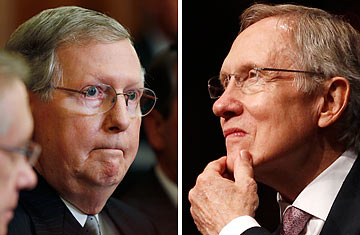
Senate minority leader Mitch McConnell of Kentucky, left, and Senate majority leader Harry Reid of Nevada
Senate Democrats will soon advance a plan to make permanent President George W. Bush's 2001 tax cuts for middle-class Americans earning less than $200,000, but let the tax breaks for the wealthiest Americans expire, two Senate party aides said Tuesday. They will also propose to reinstate a 45% estate tax on individuals for the next two years.
The emerging tax plan is designed, as much as anything else, to clarify the differences between the two parties as they hurtle toward the fall elections. Following on their success with the financial-regulatory-reform bill, Democrats are betting that Republicans will once again take up a legislative battle on behalf of the wealthy. "Republicans are going to have a real choice ahead of them," says a Democratic aide. "Are you for extending these tax cuts for middle-class families or are you against them because you want to protect tax cuts for the wealthiest 1% of Americans?"
The showdown could come as early as August, now that Senate majority leader Harry Reid has decided to keep his colleagues in Washington through the middle of next month.
The Democratic plan is neither cheap nor paid for. Making permanent all tax cuts for the middle class will cost the Treasury $2.7 trillion over 10 years, according to the Joint Committee on Taxation, at a time when Washington has already added trillions to the debt. Extending the tax cuts for the very wealthiest Americans would drain an additional $678 billion. But fiscal responsibility is not the intent of this proposal.
So far this year there has been very little discussion about reducing the red ink now, either through spending cuts or tax hikes. Both parties agree that raising taxes on the middle class, given the fragile state of the economy, would put the recovery in jeopardy.
Where the disagreement arises is on what to do about the most affluent taxpayers. Democrats believe that raising taxes on these folks won't change their spending habits and they point to former Federal Reserve Chairman Alan Greenspan, a longtime Republican who earlier this week argued that all of Bush's tax cuts should be left to lapse given the massive deficits facing the U.S. Republicans counter with the fairness argument. "Raising the top two brackets would hit 50% of small-business income — the small businesses that the President keeps imploring to create jobs. No wonder they're not doing so," says a senior GOP Senate aide.
Democrats dispute the idea that mom-and-pop small businesses are making more than $200,000 a year. In fact, 94.5% of all "flow-through" entities (self-employed folks, who generally tend to be small businesses, though Tiger Woods also falls into this category) had receipts of under $100,000 in 2007, according to the Tax Policy Center. Likewise, less than 5% of the subchapter-S companies — small businesses that have less than 100 shareholders and pay individual income taxes — made more than $200,000 in 2007. That 5% packs quite a wallop, though, accounting for more than two-thirds of tax receipts in the top two brackets and representing the wealthiest hedge funds, law firms and lobbying outlets in America, all of which file individual or partnership income taxes, according to IRS statistics.
The proposal to extend the estate tax, which expired this year, is also controversial. The House has already passed a similar measure, but Republicans are pushing an alternative that would exempt all estates under $5 million from so-called death taxes and would tax those worth more at a 35% rate. Some moderate Democrats, such as Arkansas's Blanche Lincoln, have signed on to this idea, though the bulk of the caucus supports setting the tax at 45% and the exemption level at $3.5 million. Either way, everyone agrees that something must be done before 2011 when the exemption falls to $1 million per estate and taxes anything over that at a 55% rate.
Still uncertain is when the Congress will take up this plan. House Democrats are looking to act "before the end of the year," says Ways & Means Committee spokesman Matthew Beck; Senate Democrats say they plan to act before the midterms so voters "know their choice before the election," one party aide said.
